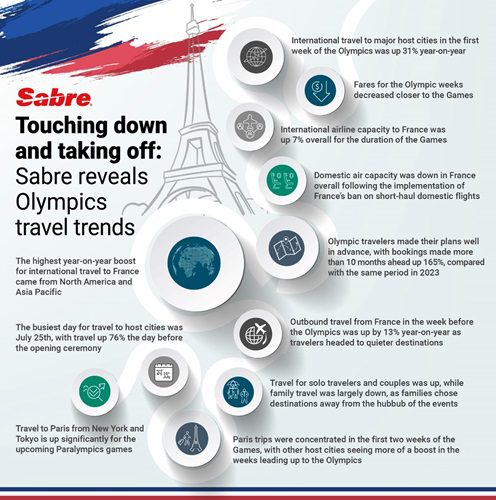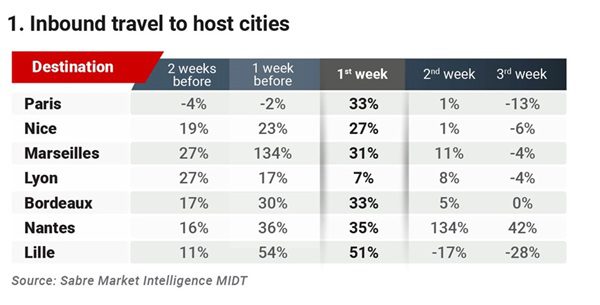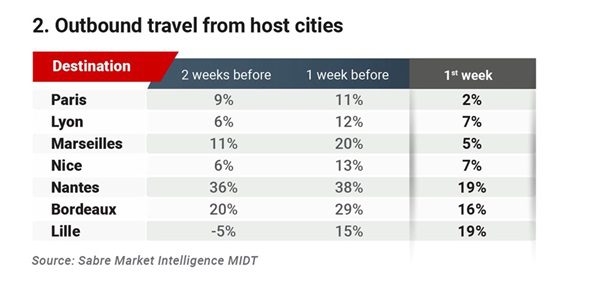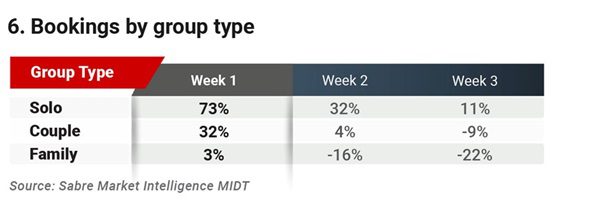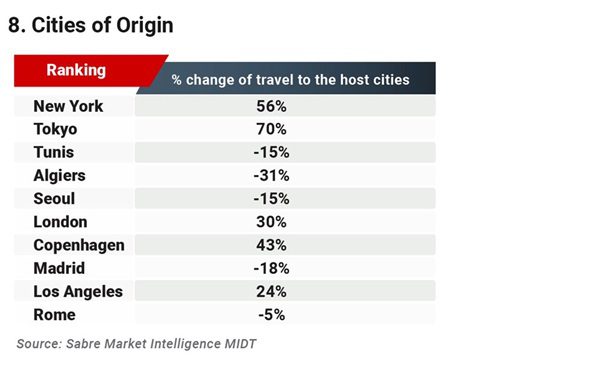 As the curtain falls on the Paris 2024 Summer Olympics, a new narrative emerges from the spectacle: the Games not only fueled an unprecedented influx of international travellers but also sparked a surprising exodus from France’s host cities. Sabre’s extensive booking analysis reveals that while the Olympics drew millions to France, a notable segment of the population chose to leave the host cities in anticipation of the global event.
As the curtain falls on the Paris 2024 Summer Olympics, a new narrative emerges from the spectacle: the Games not only fueled an unprecedented influx of international travellers but also sparked a surprising exodus from France’s host cities. Sabre’s extensive booking analysis reveals that while the Olympics drew millions to France, a notable segment of the population chose to leave the host cities in anticipation of the global event.
The Olympic Influx: A Spectacular Surge in Travel
The Paris 2024 Olympics, eagerly awaited by sports enthusiasts worldwide, catalyzed a significant boost in travel to France’s main host cities. According to Sabre’s data, international air travel to these cities surged by an impressive 31% during the Olympic period compared to last year. This spike underscores the widespread appeal of the Games, particularly after the spectator ban during the Tokyo Olympics due to the COVID-19 pandemic.
Paris, the epicentre of the Games, saw the largest share of this influx, with a 33% increase in inbound international air passengers during the week of the opening ceremony. The city’s allure was undeniable, as spectators from across the globe flocked to witness history in the making.
However, Paris was not the only city to experience this Olympic boom. Lille, another host city, reported a staggering 51% increase in air travel during the first week of the Games. Similarly, Nantes and Bordeaux saw significant upticks of 35% and 33%, respectively. This data highlights the broad appeal of the Olympics, with travellers eager to explore various regions of France while attending the Games.
An Unexpected Turn: The Exodus Ahead of the Games
In a twist few anticipated, Sabre’s analysis also uncovered a notable rise in outbound travel from France in the week before the Olympics. Specifically, outbound travel from the host cities increased by 13% compared to the same week the previous year. This exodus suggests that many locals and even some international visitors opted to escape the crowds and congestion associated with the Games, seeking refuge in quieter, less crowded destinations.
This trend was particularly pronounced among families, who appeared to prioritize peaceful retreats over the excitement of the Olympic events. In contrast, solo travellers and couples were more inclined to stay and soak in the Olympic atmosphere, with solo travel bookings rising by 69% and couples’ travel increasing by 31% year-on-year.
Early Planning, Last-Minute Arrivals: A Tale of Two Travel Behaviors
While the Olympic period saw a last-minute rush of travellers arriving in France, with a 76% surge in inbound travel the day before the opening ceremony, Sabre’s data reveals that many of these visitors had planned their trips well in advance. Bookings made more than 10 months before the Games saw a remarkable 165% increase compared to the previous year, reflecting the high demand and anticipation for the event.
Interestingly, while fares for Olympic dates were initially high, peaking around 10 months before the Games, they gradually decreased as the event drew closer. This trend indicates a strategic approach by travellers, who secured their seats early to avoid the inevitable price hikes but benefited from lower fares closer to the event.
Airline Capacity: A Balancing Act
To accommodate the surge in demand, airlines increased their capacity to France during the Olympics by 7% year-on-year. This expansion was particularly evident on international routes, as carriers sought to capitalize on the influx of visitors from abroad. However, the picture was more complex on the domestic front.
Despite the overall increase in international capacity, domestic airline capacity within France decreased by 4% during the Olympic period. This reduction is partly attributed to France’s ban on short-haul domestic flights, a policy introduced to reduce carbon emissions. Nevertheless, key domestic routes connecting Olympic host cities, such as Nice to Paris and Marseilles to Paris, saw a capacity increase of up to 21%, ensuring attendees could easily reach the Games.
The Global Reach: Where Were the Olympics Travelers Coming From?
The Paris Olympics’ global appeal was evident in the diverse origins of its visitors. Sabre’s data highlights that the most significant increases in travel to France came from Asia Pacific and North America, with the United States, Japan, and China leading the way.
During the Games, New York and Tokyo emerged as the top cities for outbound travel to Paris, Marseilles, and Lyon. In particular, Japanese travellers were strongly interested in attending football matches in cities like Bordeaux and Nantes, while American tourists flocked to Paris to experience the iconic event.
One of the more surprising findings was the dramatic increase in travel from Tokyo to Tahiti, where Olympic surfing events took place. Travel from Tokyo to Tahiti soared by an astonishing 1450% during the first week of the Olympics, showcasing the global draw of even the less traditional Olympic venues.
The Paralympics: A New Chapter in Olympic Travel
As the Olympic Games concluded, attention swiftly shifted to the Paralympics, set to commence later this month. Sabre’s analysis indicates that the Paralympics also drive a notable increase in travel to Paris, particularly from New York and Tokyo. Travel from New York to Paris on the eve of the Paralympics is up 79%, while travel from Tokyo has risen by 71% compared to last year.
This trend suggests that the Paralympics, like the Olympics, are attracting a dedicated and enthusiastic audience eager to witness the remarkable achievements of Paralympic athletes.
A Complex Landscape: The Future of Event-Driven Travel
The Paris Olympics have provided a fascinating case study of the complexities of event-driven travel. On the one hand, the Games have been a major draw for international tourists, particularly solo travellers and couples. On the other hand, the rise in outbound travel from host cities reveals some desire to escape the hustle and bustle that such events inevitably bring.
These findings underscore the importance of using advanced data analytics and technology to understand and cater to travellers’ diverse needs. Airlines, hoteliers, and travel agencies must be agile, offering tailored experiences that meet their customers’ varying preferences, whether they seek to immerse themselves in the action or retreat from it.
As the world looks ahead to future global events, from the FIFA World Cup to the next Olympic Games, the lessons learned from Paris 2024 will be invaluable. By harnessing the power of data and technology, the travel industry can ensure that it meets and exceeds travellers’ expectations, providing unforgettable experiences for all.
Written by: My Thanh Pham


